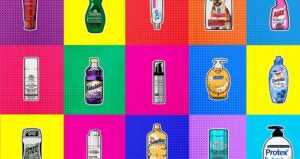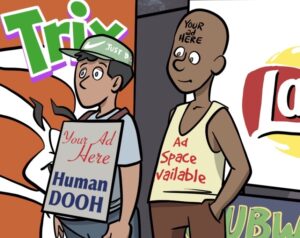Here’s today’s AdExchanger.com news round-up… Want it by email? Sign up here.
The Titans Are Tired
So many entertainment hubs – Netflix, Amazon Prime and Freevee, Paramount+ and sister app Pluto TV, Apple TV+, HBO Max, Discovery+ and the Disney triumvirate of Hulu, ESPN+ and Disney+ – so little time. Which means there just isn’t enough growth to go around.
It doesn’t help that the competition overloads marketing costs. Oh, and stocks are being crushed across the board.
And when things get bad, the M&A rumor mill turns.
But there aren’t midsize content libraries or streaming apps left since Amazon’s $8.5 billion MGM deal closed. Paramount is the next-most digestible target but would probably come bundled with an antitrust review for any buyer that could afford it. So, what’s gonna happen?
If Netflix has real advertising ambitions, it should acquire Roku, writes Vikrant Mathur, CEO of Future Today, at The Drum.
Don’t roll your eyes! Richard Greenfield of LightShed Partners has an even more ambitious parlay, which is for Disney to sell off Hulu and buy either Netflix or Roblox.
Greenfield’s reasoning centers on the content. Hulu was Disney’s crown jewel, but its main value was derived from content shared by other broadcasters – which disappeared when Disney consolidated ownership. The NBC shows left on Hulu will move to Peacock this fall.
Which is why Disney divesting Hulu and grabbing Netflix or Roblox is “no longer far-fetched,” Greenfield writes. “The idea of Reed Hastings selling seemed preposterous just months ago.”
But nowadays, who knows?
Pod Mode
The 2022 IAB Podcast Upfronts wrapped on Thursday, concluding a three-day look at the state of the industry.
The event highlighted the dominance of host-read ad messages and the power of brand endorsements from podcast creators. But the rise of dynamic ad insertion (DAI) was also a priority, particularly the ability to tailor host-read ads to specific audiences based on location, demographic or contextual signals. DAI is key to programmatic audio ad adoption, because many brands prefer the intimacy of a host-read spot.
Brands are also starting to embrace BIPOC podcast creators and ad networks that specialize in minority-led podcasts. Advertisers are looking to reach diverse audiences via host-read ads and with contextual targeting.
And here’s another theme: Nearly every presentation made clear that brand safety, attribution and measurement are the next frontiers for podcast monetization.
Speaking of, several ad tech vendors showed off their solutions for the audio space.
Podcast hosting and analytics platform Acast announced an addressability and measurement integration with The Trade Desk’s DSP to allow advertisers to target audiences down to the household level. Acast also debuted a conversational targeting solution that processes podcast transcripts, allowing advertisers to target their messages based on what’s said in an episode.
Same Name, New Nest
In a recent Big Story podcast ep, the AdExchanger team discussed Elon Musk’s Twitter takeover, which seemed like an April Fool’s joke come to life but, well, isn’t. We predicted big changes within a year.
Well, Twitter’s evolution may come sooner than that. On Thursday, Twitter abruptly fired Bruce Falck, the GM of revenue product, and Kayvon Beykpour, who held the same role for consumer products.
Twitter is also pausing most new hiring and will pull back discretionary spending, according to a memo by CEO Parag Agrawal, The New York Times reports.
Agrawal says the cutbacks are a result of missed revenue and audience estimates, as opposed to decisions by the new soon-to-be boss.
Although it may prove difficult to dissuade employees and users who are concerned about Musk – a right-wing and libertarian favorite – exerting much influence on Twitter. (Consider the recent case brought by California against Tesla for horrific systemic racial discrimination.)
For one thing, Beykpour was fired a few days into paternity leave. It’s a rare and savage move, especially for Twitter. But it’s what one might call … Musky.
But Wait, There’s More!
The NYT’s Robin Berjon on the W3C’s new “Privacy Principles” and the asymmetry of power on the web. [blog]
Google signed deals with more than 300 EU publishers to pay them for using their news content. [Reuters]
Marketing analytics startup Improvado raises $22 million, its first VC round. [VentureBeat]
Vistar Media acquires Sage+Archer, a European DOOH ad-buying company. [release]
TikTok positions itself as a complement to TV advertising. [Ad Age]
CTV impressions now outpace mobile video, per Innovid’s annual Global Benchmarks Report. [release]
Inside Google’s fierce Goliath-versus-Goliath fight against Amazon for shopping dollars. [Insider]
You’re Hired!
Extreme Reach hires Samantha Norvin as the senior director of brand for its Talent Business Affairs division. [release]
Snap hires Colleen DeCourcy, retired W+K president, as chief creative officer. [Campaign US]














